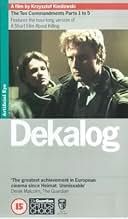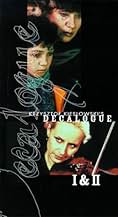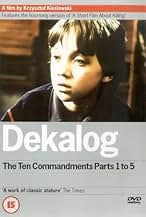A woman with a gravely ill husband and pregnant of her lover faces a dilemma: if her husband dies, she'll keep the baby; if not, she'll abort.A woman with a gravely ill husband and pregnant of her lover faces a dilemma: if her husband dies, she'll keep the baby; if not, she'll abort.A woman with a gravely ill husband and pregnant of her lover faces a dilemma: if her husband dies, she'll keep the baby; if not, she'll abort.
- Director
- Writers
- Stars
Piotr Fronczewski
- Dorota's Lover
- (uncredited)
- Director
- Writers
- All cast & crew
- Production, box office & more at IMDbPro
Featured reviews
A woman stalks her sick husband's doctor for answers and gives him a dilemma.
The basic plot is excellent and the full effect of it is not realised until the end. There are moments when the pace slightly drags and there is a reliance on some aspects of it (backstory) being told as exposition dialogue, but this does not lesson the impact of what happens.
When the Doctor makes a key decision and we learn the outcome it is pretty jaw dropping and this ties in well to the key theme of the story. Some of it is open for interpretation whether we hear and intentional lie or someone swearing a truth to God that they do not know.
Visually it retains the same bleakness we saw in part one and has some unique sequences that work incredibly well.
The seemingly continuous move from Dorota in her flat, to the Doctor's glowing red face below, across to Andrzej hospital bed and finally to the bee in the glass is an absolutely brilliant combination of cinematography and editing.
Krystyna Janda, Aleksander Bardini, and Olgierd Lukaszewics are all excellent.
The basic plot is excellent and the full effect of it is not realised until the end. There are moments when the pace slightly drags and there is a reliance on some aspects of it (backstory) being told as exposition dialogue, but this does not lesson the impact of what happens.
When the Doctor makes a key decision and we learn the outcome it is pretty jaw dropping and this ties in well to the key theme of the story. Some of it is open for interpretation whether we hear and intentional lie or someone swearing a truth to God that they do not know.
Visually it retains the same bleakness we saw in part one and has some unique sequences that work incredibly well.
The seemingly continuous move from Dorota in her flat, to the Doctor's glowing red face below, across to Andrzej hospital bed and finally to the bee in the glass is an absolutely brilliant combination of cinematography and editing.
Krystyna Janda, Aleksander Bardini, and Olgierd Lukaszewics are all excellent.
Decalogue: Two, The (1989)
*** (out of 4)
"Thou shalt not take the name of the Lord thy God in vain" is the focus of this second film in Kieslowski's series. A woman (Krystyna Janda) is going through the torment of not knowing whether or not her husband will die from his illness so she asks his doctor (Aleksander Bardini) to give her an answer. The doctor can't really say for certain but then he learns that the woman is pregnant with another man's baby. If her husband will die she will keep the kid but if he's going to live then she must have an abortion. As with the first film, this one here features some terrific acting, great direction and a wonderful look but I think the level of entertainment is a tad bit less because to the story really didn't hit me as hard as it should have. I'm not really sure what this film has to do with the original subject from the Bible but I'm sure some might see some sort of linking between the two. As for me, I found the attempt to bring the two sides together here didn't really work and I thought trying to link them was a mistake. Of course, everyone is going to see or feel something different about religion so just because these links didn't work for me doesn't mean others won't find something here. Another problem I had was that I really didn't care or feel too much for the woman going through this problem. The fact that she cheated on her husband, a sin, isn't ever really brought up nor is the possible abortion. WIth that said, the visual look of the film is extremely well done and there's no denying that the director has created a very good piece of work. The material, no matter what you feel towards it, is very well handled and is an original take on the whole idea of religion. Bardini clearly steals the film with his sad character who might be stepping over his lines due to the own pain he has suffered. Artur Barcis returns to this film playing a mysterious figure and once again does a great job.
*** (out of 4)
"Thou shalt not take the name of the Lord thy God in vain" is the focus of this second film in Kieslowski's series. A woman (Krystyna Janda) is going through the torment of not knowing whether or not her husband will die from his illness so she asks his doctor (Aleksander Bardini) to give her an answer. The doctor can't really say for certain but then he learns that the woman is pregnant with another man's baby. If her husband will die she will keep the kid but if he's going to live then she must have an abortion. As with the first film, this one here features some terrific acting, great direction and a wonderful look but I think the level of entertainment is a tad bit less because to the story really didn't hit me as hard as it should have. I'm not really sure what this film has to do with the original subject from the Bible but I'm sure some might see some sort of linking between the two. As for me, I found the attempt to bring the two sides together here didn't really work and I thought trying to link them was a mistake. Of course, everyone is going to see or feel something different about religion so just because these links didn't work for me doesn't mean others won't find something here. Another problem I had was that I really didn't care or feel too much for the woman going through this problem. The fact that she cheated on her husband, a sin, isn't ever really brought up nor is the possible abortion. WIth that said, the visual look of the film is extremely well done and there's no denying that the director has created a very good piece of work. The material, no matter what you feel towards it, is very well handled and is an original take on the whole idea of religion. Bardini clearly steals the film with his sad character who might be stepping over his lines due to the own pain he has suffered. Artur Barcis returns to this film playing a mysterious figure and once again does a great job.
One close look at this film will tell that there is always ample room for strong character portrayals in all of Kieslowski's films."Dekalog, Dwa" is a grim reminder of state controlled government institutions as it tackles a not so pleasant but touchy doctor-patient relationship. The entire film is a comment on how doctors should maintain their professional integrity when they deal with relatives of their patients who are anxious to know about the well being of their dear ones.Those who have appreciated Aleksander Bardini's role as a lawyer in Bez Konca (No End) will get a new chance to enjoy his acting abilities as he demonstrates how a simple hearted doctor can be coerced to extract information about a patient's well being.Looking at the role of a woman torn between her husband and her lover,played by Andrzej Wajda's protégée Krystyna Janda,it is hard to find how genuine is the love of such women for the men they claim to love ? Her character is depicted as a tormented soul who likes to get angry much too often.As usual Kieslowski has asked us too many moral questions whose answers are not so easy to guess.
This is Kieslowski doing Bergman and trying to make the walls elusive.
It's the elusiveness at the end that makes it worthwhile, the rest is drab. Kieslowski doesn't ground the images as well as he would in Dekalog 6 but it's driven by the same notion of dreamlike inhabiting. The dying husband comes to again, in a magical way expressing his blessing for a love that may not be there, or is it? Is it her dream where he absolves her to give birth to a love that goes forward?
Kieslowski is sketching with these Dekalogs, they're over just as they would flow off the edge of boundaries and he keeps most of it inside, but he's sketching close to the heart that makes life fluid again. Maybe it's where he apprenticed for Three Colors where I have my sights on already.
It's the elusiveness at the end that makes it worthwhile, the rest is drab. Kieslowski doesn't ground the images as well as he would in Dekalog 6 but it's driven by the same notion of dreamlike inhabiting. The dying husband comes to again, in a magical way expressing his blessing for a love that may not be there, or is it? Is it her dream where he absolves her to give birth to a love that goes forward?
Kieslowski is sketching with these Dekalogs, they're over just as they would flow off the edge of boundaries and he keeps most of it inside, but he's sketching close to the heart that makes life fluid again. Maybe it's where he apprenticed for Three Colors where I have my sights on already.
"Thou shalt not take the name of the Lord thy God in vain." The prognosis of a man languishing in a Warsaw hospital from cancer holds the key to the fate of his wife and her unborn child. In this, the second of his meditations on the ten commandments, Kieslowski again fashions a small, intimate ensemble piece into an exploration of the metaphysical and spiritual agonies of modern human life.
Did you know
Details
Contribute to this page
Suggest an edit or add missing content



















